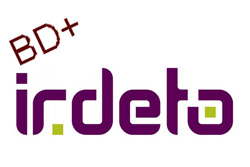Europe's online source of news, data & analysis for professionals involved in packaged media and new delivery technologies

Irdeto acquires Rovi's BD+ technology for Blu-ray Disc security
Amsterdam and Beijing-based Irdeto, a global conditional access and media security technology company, is to acquire the BD+ protection solution from Rovi Corporation. The BD+ technology, which is designed to stop digital ripping of Blu-ray discs, will fold into the company’s Irdeto ActiveCloak for Media products.
The company says this deal marks the next phase of a dedicated effort to combat entertainment piracy across online, broadcast and physical media distribution channels. “We are working closely with the studio community to ensure that movie titles released on Blu-ray disc have the same rigorous protection standards we created for Irdeto ActiveCloak for Media, says Graham Kill, CEO of Irdeto. “This is the beginning of a new era of software security, and one that is certainly welcome for companies whose livelihood depends on digital entertainment.”
Irdeto launched ActiveCloak for Media in February of this year, “the first and only dynamic security solution to protect and monetize high-value digital entertainment assets throughout their entire lifecycle.” The company was interested in integrating BD+ intellectual property, contracts, and patent licenses into its current offering.
BD+ provides a more robust security measures for Blu-ray than the current Advanced Access Content System (AACS), which has suffered from a history of security breaches and hacks. The BD+ standard is based on the Self-Protecting Digital Content (SPDC) architecture, a renewable security concept that complements Irdeto’s dynamic security technology.
Irdeto says it will enhance the effectiveness of BD+ by creating a hybrid BD+/ActiveCloak content security system that will monitor and address threats throughout each Blu-ray disc’s economic life. “The hybrid BD+/ActiveCloak security mechanisms can be reconfigured and renewed for each movie title to prevent loss of platform integrity over time, minimizing the risk that revenue from high-value movie content will be lost.”
Irdeto introduced its first digital conditional access system in 1995, and an updated version was released in the late 1990s. The first smart cards with Irdeto 2 were brought to market in October 2000 and implemented Multichoice in South Africa.
Irdedo opened its Beijing headquarters in 2007 and has now the biggest market share of any international player in Asia, with 17% of the Chinese market for conditional access and 64% share in South East Asia.
Story filed 07.07.11



















